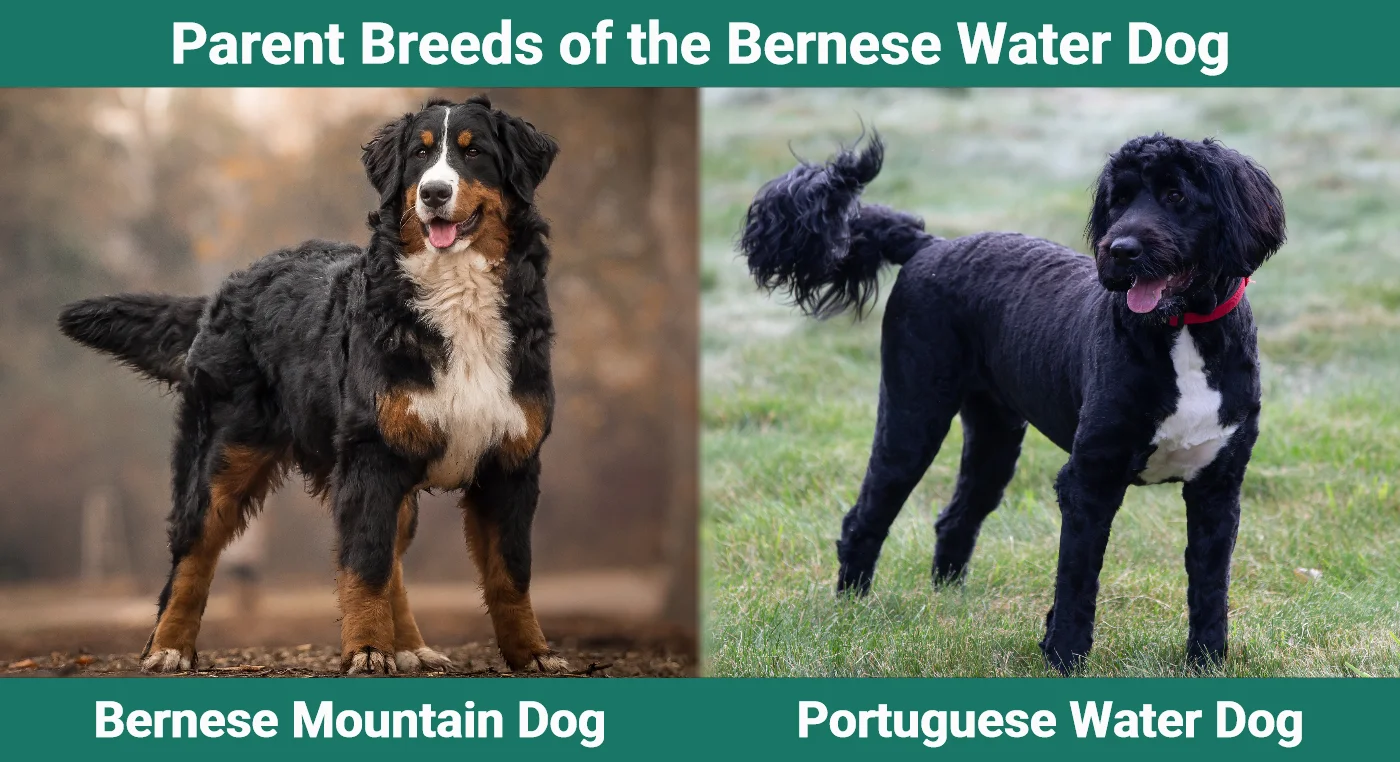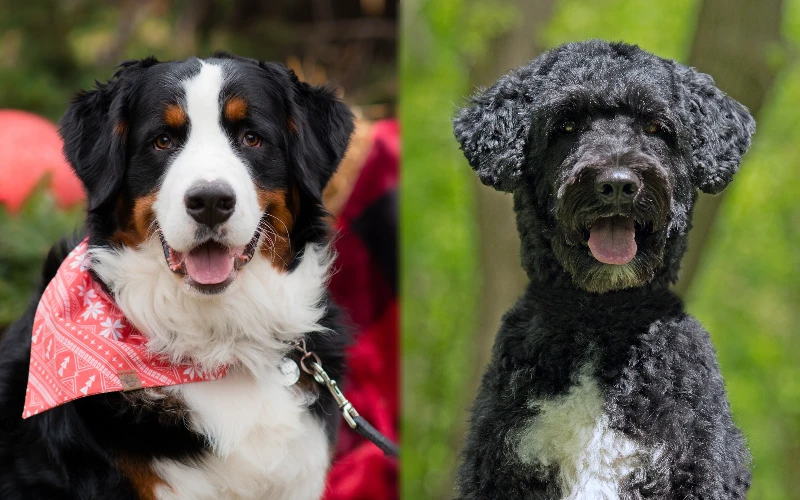Click Below to Skip Ahead
The Bernese Water Dog is an intriguing and lovable mix between the Bernese Mountain Dog and the Portuguese Water Dog. This hybrid breed combines the best traits of both parent breeds, making it a fantastic choice for active families looking for a loyal and intelligent companion.
Breed Overview
Height:
22–27 inches
Weight:
50–100 pounds
Lifespan:
10–13 years
Colors:
Black, brown, white, combinations of these colors
Suitable for:
Active families, those seeking a low-shedding, intelligent dog
Temperament:
Loyal & loving, intelligent, easy to train, friendly, gets along with other pets
This interesting mixed breed brings together the gentle nature of the Bernese Mountain Dog with the intelligence and adaptability of the Portuguese Water Dog. The result is a versatile dog that excels in various activities, making them a great companion for families who love spending time outdoors.
Bernese Water Dog Puppies
Bernese Water Dog puppies are playful, energetic, and eager to learn. Early socialization and consistent training are essential for ensuring a well-behaved adult dog. As a hybrid breed, finding a reputable breeder specializing in these dogs may be more challenging than with purebred dogs. It’s crucial to research and find a breeder who prioritizes the health and temperament of their dogs.

Temperament and Intelligence of the Bernese Water Dog
The Bernese Water Dog is a breed that boasts an affectionate and amiable temperament. They are known to be very attentive and devoted to their family members, making them a wonderful addition to any household. These dogs are easy-going, friendly, and typically have a calm demeanor, which makes them perfect for families with children or other pets. They enjoy being involved in family activities and thrive on human interaction.
Bernese Water Dogs are highly intelligent and eager to please, which makes them relatively easy to train. They are quick learners and can pick up new commands and skills with ease. Their intelligence also means they require mental stimulation to keep them engaged and prevent boredom. Providing your Bernese Water Dog with puzzle toys, interactive games, and regular training sessions will help satisfy their intellectual needs.
Are These Dogs Good for Families?
Bernese Water Dogs are indeed fantastic family pets. Their gentle, loving nature makes them perfect playmates for children, and their adaptability allows them to fit into various lifestyles seamlessly. Their friendly disposition and intelligence make them great candidates for obedience training, agility, and even therapy work, providing endless opportunities for bonding and enrichment.
Does This Breed Get Along With Other Pets?
When it comes to cohabitating with other pets, Bernese Water Dogs are generally quite amiable. They can get along well with other dogs and even cats when properly socialized from a young age. Early exposure to different animals, positive reinforcement, and consistent training will help your Bernese Water Dog develop good social skills and ensure harmonious relationships with other pets in the household.
Things to Know When Owning a Bernese Water Dog:
Food & Diet Requirements
Feeding your Bernese Water Dog a high-quality, balanced diet specifically formulated for large breeds is crucial for their overall health and well-being. The right nutrition can help prevent obesity and joint issues common in large dogs. Consult with your veterinarian to determine the appropriate amount and frequency of feeding based on your dog’s age, weight, and activity level. They may also recommend particular food brands or supplements to support your dog’s unique needs. Be mindful of treats and table scraps, as excessive amounts can lead to weight gain and potential health issues.
Exercise
Bernese Water Dogs are energetic and require regular exercise to maintain their physical and mental well-being. Daily walks of at least 30 minutes, coupled with playtime and interactive games like fetch, agility training, or swimming, are essential for keeping them happy, healthy, and mentally stimulated. These activities help to build strong bonds between you and your dog, improve socialization skills, and reduce the risk of developing behavioral issues due to boredom or pent-up energy.
Training
Early, consistent training using positive reinforcement techniques is crucial for raising a well-behaved Bernese Water Dog. These intelligent dogs respond well to praise, rewards, and gentle guidance, making them highly trainable and eager to please. Start with basic commands such as sit, stay, and come, gradually progressing to more advanced obedience and trick training. Enrolling your Bernese Water Dog in puppy socialization classes or working with a professional trainer can be beneficial in reinforcing good manners and behavior, as well as addressing any specific training needs.
Grooming ✂️
Regular grooming is necessary to keep your Bernese Water Dog’s coat healthy, clean, and free from tangles. Brushing their thick, double coat at least twice a week will help remove loose hair, prevent matting, and distribute natural oils for a healthy shine. Regular nail trimming, every 3–4 weeks, prevents overgrowth and discomfort. Ear cleaning should be done weekly to prevent infections, and dental care, including teeth brushing and dental chews, will help maintain oral health and prevent bad breath.
Health and Conditions in Bernese Water Dogs
As a mixed breed, Bernese Water Dogs may inherit health issues from either the Bernese Mountain Dog or the Portuguese Water Dog parent breeds. Regular veterinary check-ups, vaccinations, and preventive care can help identify and address any concerns early on, ensuring your pet’s well-being. While this breed is generally healthy, it is essential to be aware of potential health conditions that may affect your Bernese Water Dog.
- Allergies
- Ear infections
- Skin issues
- Hip dysplasia
- Elbow dysplasia
- Bloat (gastric torsion)
Hip Dysplasia
This genetic condition occurs when the hip joint doesn’t develop correctly, resulting in the femur bone not fitting snugly into the hip socket. Over time, this can lead to arthritis and pain, affecting your dog’s mobility and quality of life. Regular vet check-ups, maintaining a healthy weight, and providing joint supplements can help manage and prevent hip dysplasia.
Elbow Dysplasia
Similar to hip dysplasia, elbow dysplasia is a developmental disorder affecting the elbow joint. It can cause pain, lameness, and eventually arthritis. Treatment options include weight management, anti-inflammatory medications, joint supplements, and, in severe cases, surgery.
Bloat (Gastric Torsion)
Bloat is a life-threatening condition where the stomach fills with gas and twists on itself, cutting off blood supply to vital organs. Signs include a swollen abdomen, restlessness, drooling, and attempts to vomit without success. Bloat requires immediate emergency treatment, which may include surgery to untwist the stomach and prevent recurrence. To reduce the risk of bloat, feed your dog smaller meals throughout the day and avoid vigorous exercise immediately after eating.
Allergies
Bernese Water Dogs can suffer from various allergies, including food, environmental, and contact allergies. Signs may include itching, redness, and skin infections. Work with your veterinarian to identify the cause of the allergy and implement a treatment plan, which may involve dietary changes, medications, or allergy shots.
Ear Infections
Due to their floppy ears, Bernese Water Dogs are prone to ear infections caused by bacteria, yeast, or mites. Regular ear cleaning and keeping the ears dry can help prevent infections. If your dog shows signs of an ear infection, such as head shaking, scratching, or discharge, consult your veterinarian for appropriate treatment.
Skin Issues
Skin problems, such as hot spots or dermatitis, can occur in Bernese Water Dogs due to allergies, parasites, or other underlying health conditions. Regular grooming and bathing with a gentle, hypoallergenic shampoo can help maintain healthy skin. Consult your veterinarian if you notice any skin abnormalities, as prompt treatment can prevent complications.
Male vs Female
There are no significant differences in temperament or behavior between male and female Bernese Water Dogs. However, males may be slightly larger and more robust than females. Spaying or neutering is recommended to prevent unwanted litters, reduce the risk of certain cancers, and minimize hormone-driven behaviors such as marking or aggression. Consult with your veterinarian to determine the best time for this procedure, typically around six months of age.
3 Little-Known Facts About Bernese Water Dogs
1. The Bernese Water Dog is a hybrid breed.
The breed combines the traits of the Bernese Mountain Dog and the Portuguese Water Dog.
2. They are highly adaptable and excel in various activities.
This makes them suitable for active families who like to take them to new places and try new things.
3. They are gentle giants.
Despite their size, Bernese Water Dogs are known for their gentle nature and get along well with children and other pets.
Summing Up
The Bernese Water Dog is a loving, intelligent, and adaptable breed that makes an excellent family companion. Their friendly nature and eagerness to please make them well-suited for various activities, including obedience training, agility, and therapy work. Ultimately, the strong bond you create with your Bernese Water Dog will bring joy and companionship to your family for years to come.
Related Read:
- Golden Retriever Portuguese Water Dog Mix: Care, Pictures, Info & More
- Portuguese Water Dog Poodle Mix: Care, Pictures, Info, & More
Featured Image Credit: Left – Shayna Douglas, Unsplash | Right – Jennay Hitesman, Shutterstock











